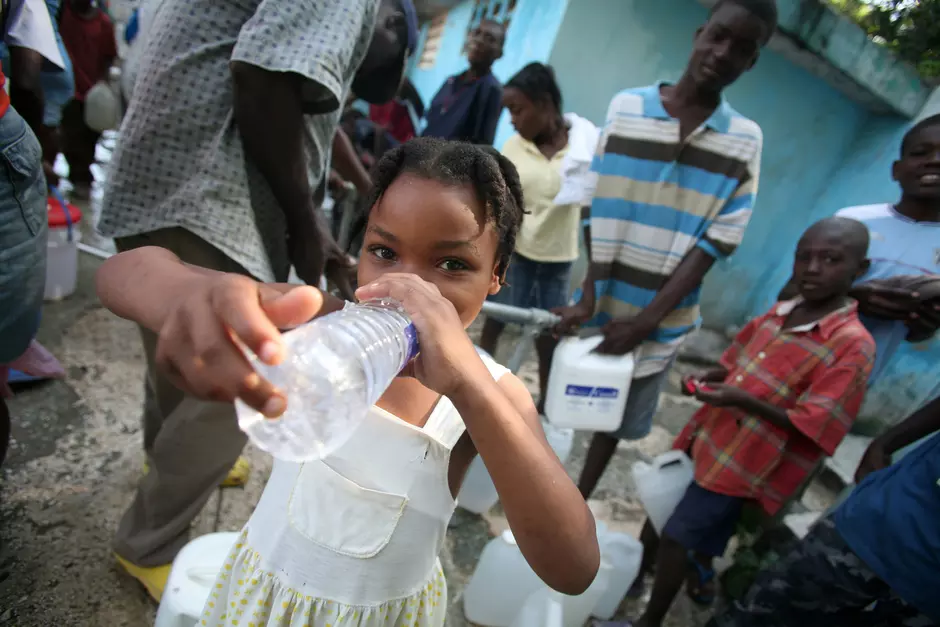
Emergency and development
Place:Port au Prince, Haiti
Date:
January 2010 to February 2013
Type of intervention:
Water
Emergency equipment
Post-crisis assessment
Technical analysis
Develop skills/training
Operations support
First mission: the immediate response to the earthquake
The Veolia Foundation sprang into action immediately after the earthquake hit Haiti on January 12, 2010. By January 13, it had sent more than 20 tonnes of emergency equipment to Haiti in a cargo plane chartered by the French Red Cross and the first Veoliaforce volunteers were ready to start working in Port-au-Prince by January 16.
After assessments carried out by the Veoliaforce experts and the emergency response team of the French Red Cross, fresh water supplies were able to be organized in two neighborhoods of the capital, Delmas and Cité Militaire. Aquaforce 5000 mobile units were deployed to supply the Haitian hospital, Ofatma, as well as a primary health center run by the German Red Cross. In addition, more than 54 water distribution points were set up with storage tanks and manifolds that were supplied by tankers with water from boreholes that were still functioning. In all, more than 130,000 people were supplied with drinking water.
The Veoliaforce volunteers working in support of Action Against Hunger, mobilized an Aquaforce 5000 unit in the center of the town (the Turgeau neighborhood) within the secure perimeter of the Port-au-Prince municipal water company. This station enabled the distribution of fresh water by trucks for almost 35,000 people in two districts in the center of the town (Camp Vert and Bois Patate). On the Champ de Mars where the largest group of earthquake victims in Port-au-Prince was sheltering, a second Aquaforce 5000 unit was installed and latrines were built to help with the problem of sanitation.
At the request of a third partner, the NGO Solidarités International, two tonnes of storage and distribution equipment was packaged and sent to Haiti by the Veoliaforce humanitarian platform to respond to their urgent need.
Second mission: post-emergency development aid
The involvement of the Veolia Foundation in Haiti continued for three years following the catastrophe with development projects that extended the initial emergency interventions.
After the re-emergence of cholera in the months following the earthquake, the Veolia Foundation, in partnership with the French Red Cross, sent several volunteers into the field at the end of 2012 to help the emergency response teams working in the Grande Anase department in Haiti. They secured the supply of water and sanitation coverage for the cholera treatment centers and carried out hygiene awareness training with the local people. In this way, more than 20 cholera treatment centers were dealt with by Veoliaforce in the south of the country. In addition, equipment was shipped out and left in place to help in the fight against the disease.
In Petit-Goâve, in particular, the water supply system was entirely renovated and teams from DINEPA, the Haitian national department of drinking water and sanitation, were trained to operate and maintain the installations. These teams have a system to regulate the chlorine according to the volume of water flow but can themselves set the level in the water. The equipment is permanently installed and is performing well.
Place:
Port au Prince, Haiti
Grant(s) :
Selection Committee 2010/01/12
« The level of destruction on the island was particularly shocking. I remember thinking it looked like a war zone, with islands of survival like the Red Cross camp. On the professional front, my partner, Philippe Deparday, will tell you that I was very stressed in the airplane. And he was right! The major difficulty in the first few hours is to get through the fog that surrounds you: you don’t know anything about the context, you have no map of the buried water system, in short, you’re lost. Then gradually, as you establish contact with the local authorities, you start putting the puzzle together, to formulate problems that you are familiar with and that begin to come into your area of expertise. »
Read all of the testimonial of Guy de Sainte-Claire here.

